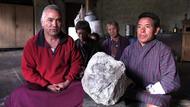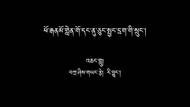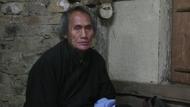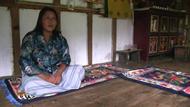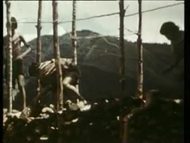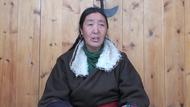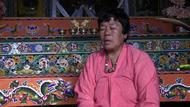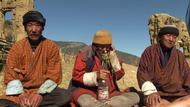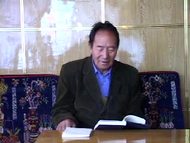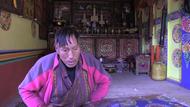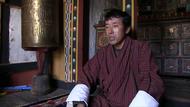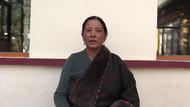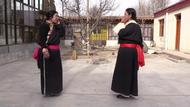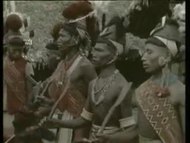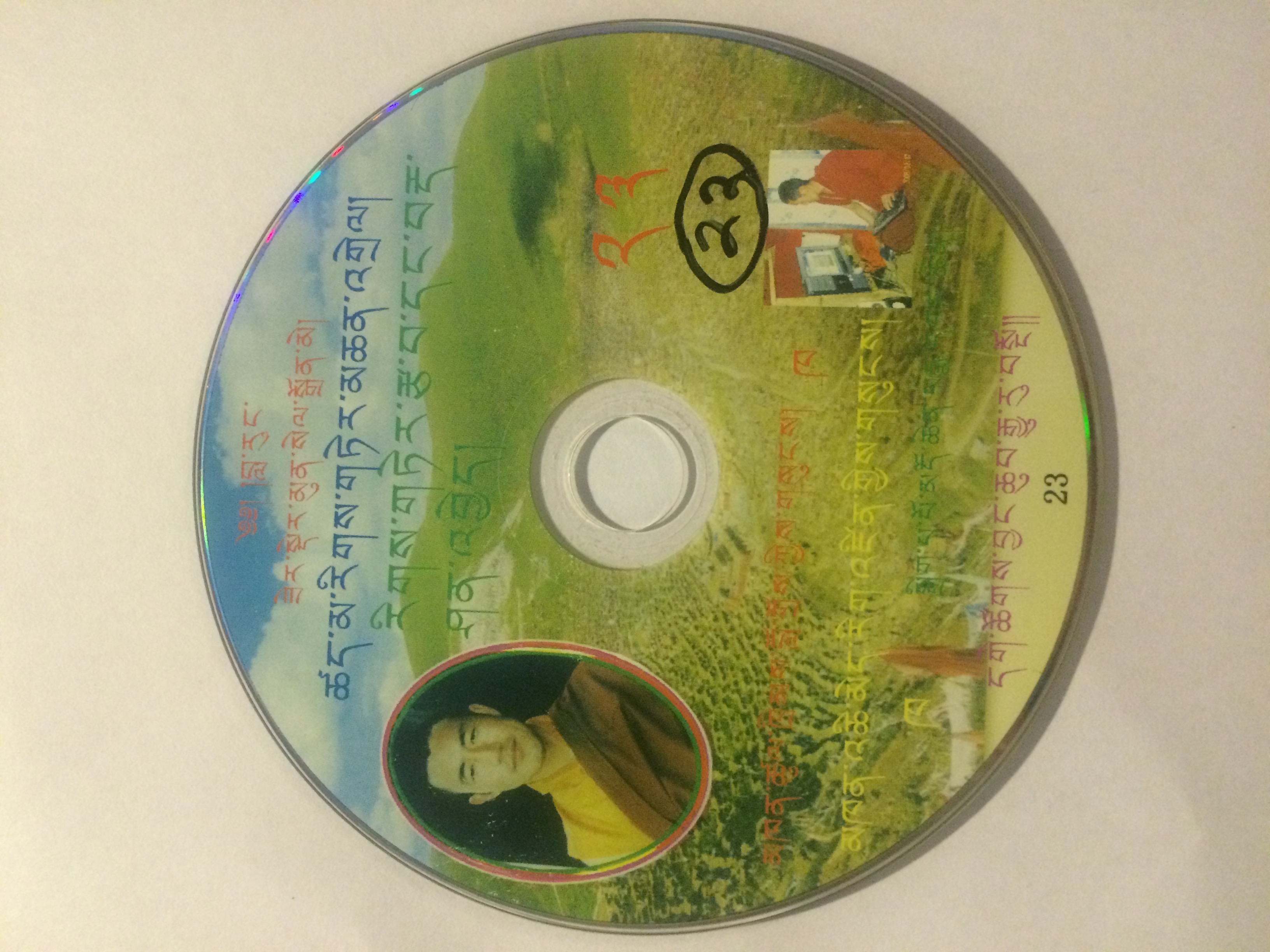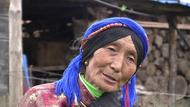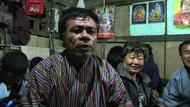Video Overview
Karma Nyadru is a special festival for the people living around Paro and few other western Dzongkhags. The festival is celebrated on the 15th day of 10th month in the lunar calendar. The day is considered auspicious and many people in the community conduct annual rituals on that day. Karma refers to the stars in the sky and particularly the group of stars consisting of six stars known as Pleiades and to the Bhutanese known as Karma Mindrug. Nya refers to the full moon and dru is drawn from the belief that during this particular night the moon and the Pleiades come together once a year. Hence, the festival is known as Karm Nyaru in the region in Dogar. People play archery on the day and celebrate at the fullest.
- ཤེས་རབ་རྡོ་རྗེ་་ལགས་སོ་ ད་ དང་ཕུ་གི་ ང་བཅས་ར་གི་ བྱང་འོག་སྐརམ་ཉ་རུ་(དྲུག་)གི་བཤད་པ་འདི་རྐྱབ་དགོ་པ་ཅིན་ ང་བཅས་ར་ ཏེ་ བྱང་སྐརམ་ཉ་རུ་(དྲུག་)ཟེར་སླབ་དགོ་པའི་དོན་དག་འདི་ ང་བཅས་ཀྱི་ཚེ་ སྐརམ་ ཨ་ནི་ཚེས་བཅོ་ལྔ་ལུ་ སྐརམ་འདི་གནམ་མེད་ས་མེད་ ལེགས་ཤོམ་ཨིན་ཟེར་ ཏེ་ གཞུང་གིས་འབད་རུང་ ཨ་ནི་སྦེ་བརྩིཝ་ཨིན། ང་བཅས་ར་ནཱ་གཡུས་ཁ་འབད་རུང་ཡང་ ཆོ་ཀུ་བཏང་ནི་ཡོད་རུང་ ནེམ་ གཟའ་སྐར་ཡང་བལྟ་མོང་དགོ་ oky! if i need to explain on the ancient lower northern six star, the reason we call that six star is that the star of the date, this star on 15th day of the bhutanese calendar is considered best. Even the government consider it as best. here at our village also even while performong our annual ritual we need not have to look for the Zaka(havenly body)
- ཤེས་རབ་རྡོ་རྗེ་་ཨ་ནཱི་སྐརམ་ཉ་རུ་(དྲུག་)འདི་ ཨ་ནཱི་སྦེ་ཨིན་ཟེར་ རོགས་ཕར་ དགོན་སྡེ་ སོ་སོ་ཁ་ལུ་ཡང་ ཏེ་ ཕྱྭ་ཁུག་རྐྱབ་དགོ་མི་འདི་ ཨ་ནཱི་སྐརམ་ཉ་རུ་(དྲུག་)འདི་ ཕྱྭ་ཁུག་ཞག་གསུམ་རྐྱབ་དགོ་ཟེར་ རོགས་འཕགས་པ་དགོན་སྡེ་པ་ཚུ་ཡང་ ཨ་ནཱི་སྦེ་གསུངས་མས་ལགས། ཏེ་ ཨ་ནཱི་གནང་དགོཔ་འདི་ ང་བཅས་ར་ ན་བཞག་ཞིནམ་ད་ ཏེ་ ང་བཅས་ར་ ད་ ད་ ཚེས་བཅོ་ལྔ་ལུ་ ཏེ་ སྐརམ་ཉ་རུ་(དྲུག་)བརྩི་དགོ་མི་འདི་ དོན་དག་ག་དེ་སྦེ་སྨོ་ཟེར་བ་ཅིན། So it was like that this six stars, thats is why itb is said that those different monastice body they need to perform three days ritual. So this way of performing was kept here and we mark the six star during the 15th day on the bhutanese calendar. The reason for observing the six stars is...
- ཤེས་རབ་རྡོ་རྗེ་་ང་བཅས་ར་གི་ ཟླཝ་འདི་ཤརཝ་ད་ ད་ ཟླཝ་བཅུ་གཉིསཔ་ བཅུ་ བཅུཔ་སྨོ་ལགས་ ཟླཝ་བཅུ་པའི་གི་སྐརམ་འདི་ ཨིན་ཅིག་མིན་ཅིག་ ཏེ་ ཨ་ནཱི་ ནམ་ཚོད་ཟེར་ དང་ཕུ་འབད་བ་ཅིན་ ནམ་ཚོད་ཟེར་སླབ་དགོ་བ་སྨོ་ལགས་ སྐརམ་ཕར་ལས་ཤརཝ་ཅིན་ ནམ་བསྲོ་ དེ་ལས་ སྐརམ་ཡར་འཛུལཝ་ཅིག་ ནམ་ལངམ་མས་ ཏེ་ ཨ་ནཱི་ ཤར་ལས་ སྐརམ་འདི་ཤརཝ་ཅིག་ དུས་ཅི་གི་ཚེས་བཅོ་ལྔ་གི་ཟླཝ་འདི་ཡང་། when the moon was rising, 12th and 10th month of bhutanese calendar and the star of the 10th month should be nam tshey, in the olden days it was called as nam tshey. Right after the shining of this star it gets dusk and when that start sets the dask begins. So then after shining this star this years moon of the 15th day of the bhutanese calendar also....
- ཤེས་རབ་རྡོ་རྗེ་་ཨ་ནཱི་སྐརམ་ཤར་ས་འདི་ཁ་ལས་ཤརཝ་ད་ ཁོང་གཉིས་ཀུ་ ཏེ་ ཨ་ནཱི་ ང་བཅས་ར་འབད་བ་ཅིན་ གཉེན་རྐྱབ་ དགའ་སྟོན་འདི་ཨ་ནཱི་བརྩིཝ་ཨིན་ ཏེ་ ལོ་གཅིག་ལུ་ཚར་གཅིག་མཇལ་ མཇལ་འཕྲད་མཛད་མི་ཚུགས་པས་བ་ལགས་ ཨ་ནཱི་སྐརམ་ཉ་རུ་(དྲུག་)ཟེར་བའི་དོན་དག་འདི་ དང་པ་རང་གཅིག་ཨ་ནཱི་ཨིན་ལགས། shine from the that same place where the star shine. Thus this two if incase in our place its lke a wedding ceremony. So we can see it once in a year but sometimes we cant. so this could be the first reason for the six stars.
- ཤེས་རབ་རྡོ་རྗེ།Sherab Dorji: ཏེ་ དེ་ལས་ང་བཅས་ར་ད་ ནཱ་གཡུས་ཁ་ལུ་ སྐརམ་ཉ་རུ་(དྲུག་)བརྩི་དགོ་མི་འདི་ ང་བཅས་ར་ནཱ་ ནཝ་ཚཝ་མེད་ སྐྱིད་ཏོང་ཏོ་སྦེ་ ཚ་གྱང་སྡུག་བསྔལ་ག་ནི་ཡང་མེད་པའི་སྐབས་སུ་ལུ་ ང་བཅས་ར་ཚེས་བཅུ་གསུམ་ལས་ གོ་ལ་འཁྱུ་མི་གིས་འཁྱུ་ ཨམ་སྲུ་གིས་འབད་སྦེ་ ཕོ་རྒྱ་གིས་ མདའ་གཞུ་ཅ་ལ་སྒྲིག་ འ་ ད་ ང་བཅས་ ཉ་རུ་(དྲུག་)རནམ་ཨིན་ཟེར་ ནངས་པར་ ད་ ད་རེས་ཚེས་བཅུ་གསུམ་ཨིན་ ནངས་པར་ཚེས་བཅུ་བཞི་ཨིན་ ནངས་པར་ངལ་གསོ་ གནངས་ཚེ་ལས་ད་ ང་བཅས་ར་ ཏེ་ ཉ་རུ་(དྲུག་)བཟའ་དགོ་ཟེར། And the reason for celebrating the six stars at the village is because while are enjoying the peace and prosperity without any tension. women they start washing clothes from the 13th day of the bhutanese calendar and the men they prepare bow and arrow for the archery, now our celebration for six star is coming near today is 13th day and tomorrow will 14 and need to take rest and after that we need to celebrate the six star.
- ཤེས་རབ་རྡོ་རྗེ་་ཏེ་ དང་ཕུ་འབད་བ་ཅིན་ ཏེ་ ཨ་ནཱི་ཕགཔ་སྦོམ་ཤོས་རེ་བཙུགས་དགོ་པས་ ཤ་ཕུད་ཟེར་ ད་ ཨ་ནཱི་ ང་བཅས་ར་ ག་ར་ ཆོས་ ཆོས་སེམས་ཅན་ལས་འབད་ ཏེ་ ཕགཔ་རྩ་ལས་བཙུགས་ནི་མེད་ལགས། ཏེ་ ཤ་འདི་ཕར་ བ་ཛར་ ཁྲོམ་ཁ་ལས་ཉོ་ འབད་བའི་འཕྲལ་ལས་ ང་བཅས་ར་ ཉ་རུ་(དྲུག་)གི་ཤ་འདི་ ཨ་ནཱི་སྦེ་ཨིན་ལགས། ཏེ་ད་ ཁྱིམ་ནང་ལུ་ཡང་ དྲོ་པ་ཚེས་བཅོ་ལྔ་འདི་ ཏེ་ད་ ལྷ་བསང་ཅིག་ཡང་བཏང་། in the olden days we need to raise one pig each to be offer as a meat offering, but now a days people being turned into dharma and and the meat was brought from the market as a meat of six star and the raising pig was abolished. At home also we used to perform a purifying ritual during the day of 15th...
- ཤེས་རབ་རྡོ་རྗེ་་ཁྱིམ་ནང་ཆོསཔ་ཡོད་པ་ཅིན་ ཆོསཔ་མེད་རུང་ཡང་ ཏེ་ཆོསཔ་འཚོལ་ ལྷ་བསང་ཅིག་ཡང་བཏང་ ཁྲུས་གསོལ་ཅིག་ཡང་འབད་སྦེ་ ཨ་ནཱི་སྦེ་འབད་བའི་སྲོལ་ཡོད་ལགས། ཏེ་ འ་ནཱི་འབད་ཚར་ཞིནམ་ལས་ ད་ ང་བཅས་ར་གི་ དཔེ་འདི་བཞག་པ་ཅིན་ ཨ་ནཱི་ ང་བཅས་རའི་བར་མཚོ་གཡུས་བཞི་པོ་ལུ་ གཡུས་གསུམ་འདི་ལུ་ ཨ་ནཱི་མེད་ལགས་ སྲོལ་མེད། ང་བཅས་རའི་གླང་མིག་ཁ་ཟེར་མི་འདི་ ཏེ་ ཨ་ནཱི་ལྷ་ཤིང་འདི་ ང་བཅས་འ་ནཱ་རྐྱངམ་ཅིག་རང་ཨིན། if you have a clergy, even if you dont have clergy also we search it from other and used to perform a purifying rituals, we have kind of culture. if i keep an example among our Bartsho four village three of them dont have this culture. we the Lhangmig kha village had only erected this godly prayer flag.
- ཤེས་རབ་རྡོ་རྗེ་་འདི་ ལྷོང་དགོ་མི་དོན་དག་འདི་ག་དེ་སྦེ་སྨོ་ཟེར་བ་ཅིན་ དང་ཕུ་ ཏེ་ ཨ་ནཱི་ གཡུས་ཚན་ཨ་ནཱི་ནང་ལུ་ ཏེ་ ནད་སྒྲོལམ་ ཛ་ཧུ་རྒྱལམོ་ ཟེར་མི་ཅིག་ཡོདཔ་མས་ལགས། ཏེ་ ནད་སྒྲོལམོ་ཛ་ཧུ་རྒྱལམོ་ ཟེར་མི་འདི་གིས་ ཏེ་ ལོ་ནམ་ཆ་ར་ ནད་སྐྱེལ་ཏེ་གིས་ ཏེ་ རྒྱ་ནག་མི་སེམས་ལོ་ འབྲུམ་ནད་ལོ་ དེ་ལས་ ཨ་ནཱི་སྦེ་ ཏེ་ ནད་སྐྱེལ་ཏེ་གིས་ ཏེ་ ཆུང་ཤོས་འདི་ ཨ་ནཱི་ དེ་བསྒང་ དམར་ཕྱེད་ཟེར་ ཤནམ་ཟེར་སླབ་མས་སྨོ་ལགས། The reason for erecting this flag is because in this village there was a ནད་སྒྲོལམ་ called Zahu Gyalmo who used to bring a disease like janag poi sem, dumnay to this village yearly. thus like wise the smallest was called animal sacrifice, hunter.
- ཤེས་རབ་རྡོ་རྗེ་་ཨ་ནཱི་སླབ་མས་ལགས་ འ་ནཱི་སླབ་དགོ་མི་གི་རྒྱུ་མཚན་འདི་ ནད་སྒྲོལམོ་ཛ་ཧུ་རྒྱལམོ་ ཟེར་མི་འདི་གིས་ ཨ་ནཱི་སྦེ་རང་འབད་དེ་ འབད་དེ་འཐོན་སོངམ་ད་ ཏེ་ ང་བཅས་ཀྱི་ ནཱ་ལས་ང་བཅས་རའི་གཡུས་ཁ་གི་མི་ཚུ་གིས་ ཚར་གཅིག་ཞུ་ཞུཝ་མས། དབའི་ ད་ ང་བཅས་ ནཱ་ གཡུས་ཁ་ལུ་ ན་ནི་ཚ་ནི་འདི་ སྤུ་ལས་རང་མི་ཆད་པས་ ཤི་ཆད་རེ་འབྱུངམ་མས་ ད་ནཱི་ དོན་དག་འདི་ག་ཨིན་ན་སྨོ་ཟེར་ སླབ་སྟེ་འབདཝ་ད། so it was said like that, the reason for saying like that could be because this naydoelma zahu Gyalmo likewise when it getout like this, here at our village we experince a countinous disease and death and we aske oh! why our villager is having sickness and its nonstop what could be the reason.
- ཤེས་རབ་རྡོ་རྗེ་་ཏེ་ དེ་ལས་ ཨ་ནཱི་ ཞབས་དྲུང་གིས་ ཏེ་ ཁྱེད་རང་གཡུས་ཁ་ལུ་ ཨ་ནཱི་སྦེ་ ནད་ ནད་ མུ་གེ་འཐོན་ཏེ་འབད་བ་ཅིན་ ཁྱེད་རའི་གཡུས་ཁ་གི་ཡུལ་ལྷ་ ལེགས་ཤོམ་འབད་མཆོད་དགོ་ཟེར་ ཨ་ནཱི་ དགྲ་ལྷ་འདི་ལུ་ ཁྱེད་གཉེར་ཁ་བཅོས་ཤིག་ཟེར་ ཏེ་ དགྲ་ལྷ་འདི་ལུ་ གཉེར་ཁ་བཅོས་སྦེ་ཞིནམ་ལས་ ལྷ་ འཚབ་དང་འཚུབ་མེད་ རྐྱེན་དང་བར་ཆད་མེདཔ་སྦེ་ ཁོ་གིས་འབད་འོང་ཟེར་ ཏེ་ དགྲ་ལྷ་འདི་ལུ་ གཉེར་ཁ་བཅོསཝ་ད། So then the Zhabdrung if you are having lots of disease and stravation you need to perform a offering ritual to to your local deities and ask them to take care of you. So then you all can get rid of those disease and stravation and they will take care of you.
- ཤེས་རབ་རྡོ་རྗེ་་ཁྱེད་རའི་གདང་ གདང་རས་སྦུག་ལུ་ ལྷ་ཤིང་ཅིག་ ལྷོང་དགོ་ཟེར་ ལྷ་ཤིང་འདི་གུ་ལུ་ ད་ ཡར་ལས་མར་ དབང་ཕྱུག་ཆེནམོ་ཟེར་ ང་བཅས་ར་ད་རེས་ ང་བཅས་ར་འཇིག་རྟེན་མི་གནག་པའི་གི་ བུག་ལུ་འབད་བ་ཅིན་ ང་བཅས་ ངོ་མ་ཚར་བའི་དོན་ལས་འབད་ དབང་ཕྱུག་ཆེནམོ་ཟེར་སླབ་མས་སྨོ་ལགས། ཏེ་ ང་བཅས་ར་ ངོ་མ་ཚར་ ག་ནི་ཡང་མེད་པ་ཅིན་ སྤོ་མཇེའུ་བློ་གྲོས་ཟེར་སླབ་མས་ལགས། you need to erect a godly prayer flag in the middle of your village and fixe the wangchuck chenmo (wooden phallus), which we the lay people called it as not to feel shy. if we dont feel shy we called it as po mew loday.
- ཤེས་རབ་རྡོ་རྗེ་་ཨ་ནཱི་ཁག་གཉིས་སྦེ་འདུག་ལགས། ཏེ་ ཨ་ནཱི་ལས་ ཨ་ནཱི་ཡར་ མདངམ་ཕྱི་རུ་ སྦྲགས་ཅི་བ་སྨོ་ལགས་ ཨ་ནཱི་སྦྲགས་ཏེ་སྦེ་འབདཝ་ད་ ཏེ་ ད་ ང་བཅས་ཀྱིས་ ཨ་ནཱི་སྦེ་ འབད་སྦེ་ཞིནམ་ད་ ཏེ་ ག་ར་ང་བཅས་ར་ ཨ་ནཱི་ ད་ ཕར་ལས་ཚུར་ ལྷ་ཤིང་འདི་དྲངས་པའི་ནམ་དུས་ལུ་ཡང་ ད་ ཨ་ལུ་བཞི་ཆ་སྟེ་ ཏོག་ཙེ་བཞི་འབག་ ཏེ་ འོ་འ་ཟེར་ སླབ་དགོ་ལགས་ ཕར་ དོ་རུང་ཚར་གཅིག་རྒྱུགས་ དེ་ལས་ ཕར་ལས་ཚུར་ལོག་ And it was in a two account. last night's was better then this rigt? it was a better thus we need to do like this and while we are doing this erecting the flag four kids should carry four spad and should say woo...waa. Again need to run once and need to come back.
- ཤེས་རབ་རྡོ་རྗེ་་ཏེ་ ནད་སྒྲོལམོ་ཛ་ཧུ་རྒྱལ་མོའི་ ཁ་ལས་ཕར་ སྤོ་མཇེའུ་བློ་གྲོས་སོང་ཟེར་ [མཇེ་ཕོ་འདྲེ་གི?] ཨ་ནཱི་སྦེ་རང་རྐྱབ་དགོ་ལགས། ཏེ་ ཨ་ནཱི་སོང་ཟེར་སླབ་དགོ་མི་འདི་ ཏེ་ གནསམོ་ ནད་སྒྲོལམོ་ཛ་ཧུ་འདི་ ཨ་ནཱི་སྦེ་ ཨ་ནཱི་ཁ་རྒྱང་འོངམ་ད་ སྤོ་མཇེ་བློ་གྲོས་འདི་ཨ་ནཱི་ཁ་ནང་རྐྱབ་པའི་ཚུལ་འཚམས་ཅིག་སྦེ་ ཏེ་ ཨ་ནཱི་སྦེ་འབད་དེ་གིས་ ཏེ་ ཨ་ནཱི་ལས་ ད་ ང་བཅས་ཀྱི་ ཨ་ནཱི་ ལྷ་ཤིང་འདི་ལྷོང་ད་ཞིནམ་ལས། Then through the mouth of naydrolm Zahu Gyalmo po mew loday, need to do like this. And the reason for telling it to go away is because when the naydrolm Zahu gyalmo comes opening her mouth, so its like puting that phallus in her mouth. So from there we after erecting the flag......
- ཤེས་རབ་རྡོ་རྗེ་་ཏེ་ ཨ་ནཱི་ འཚབ་འཚུབ་ རྐྱེན་དང་བར་ཆད་ ཨ་ནཱི་སྦེ་ཞི་འདི་གིས་ ཏེ་ ང་བཅས་ར་ དགྲ་ལྷ་ལུ་གཉེར་ཁ་བཅོས་ ཕར་ཨ་ནཱི་སྦེ་བཞག་བཞགཔ་མས་ལགས། ཏེ་ འ་ནཱ་ལས་ དགྲ་ལྷ་འདི་ལུ་ ང་བཅས་ དེ་བསྒང་འབད་བ་ཅིན་ ཏེ་ སྔོན་མ་སྔོན་འབད་བ་ཅིན་ ར་རེ་བཏང་དོ་མས་ལགས། ལུག་ཡོད་བ་སྟེ་ལགས་ ལུག་རེ་བཏང་དོ་མས་ལགས། དམར་མཆོད་ དམར་མཆོད་སྦེ་རྐྱབ་དགོ་པས་ལགས། So because of those obstacles and distrubance we seek help from local deities and asked them to take care of us. From here after in the olden days we used to sent each goat to the deities, and we have sheep and we sent sheep. thus practicing the animal sacrifices.
- ཤེས་རབ་རྡོ་རྗེ་་དེ་ལས་ འདི་ ར་དང་ལུག་འདི་ ཡུདཔ་ཅིག་ཧ་ལམ་ རྒྱུན་ཆད་སོ་ཞིནམ་ལས་ ཏེ་ དེ་ལས་ གླང་བཏང་དགོ་ལགས་ ལུག་རེ་གླང་རེ་ ཏེ་ གླང་འདི་ཨ་ནཱི་ རབས་ཆད་རུང་ ང་བཅས་ཀྱི་ ལྷ་ཤིང་རྩ་བར་ལས་ ཆུ་བླུགས་ ཆུ་བཤལ་རྐྱབ་ ཏེ་ ཆང་ཕུད་སྟོརཝ་ཅིག་ ཏེ་ བསད་པ་ཅིན་ཏེ་ འ་ ད་འབདན་ ཏེ་ དགྲ་ལྷ་གིས་བཞེས་ཅིག་ ཏེ་ བསད་ད་ཡི་ཟེར་ ཕྱྭ་དང་ཧུ་རྐྱབ་ ཏེ་ འ་མར་ལས་ཆུ་ཅིག་ ཏེ་ ཡར་ལྟག་ལས་ ཁ་ཙ་ང་བཅས། Then after the cessation of offering sheep and goat, then starts to send a ox. we used to sent a ox and if the ox is a sterile we need to take it to that prayer flag and pour the water to bath him and make the first alchol offering and kill it and shout by saying we killed it now local deities you can have it. And the water from there and from above where we yesterday...
- ཤེས་རབ་རྡོ་རྗེ་་ནཱ་ སློབ་དཔོན་དང་ ང་བཅས་འགྱོ་སའི་ཨ་ཡི་ལུ་ ཏེ་ མར་འོག་ལས་ ཆུ་ཅིག་ཡོད་ལགས་ ཨ་ནཱི་ཆུ་འདི་གི་རྩ་བ་ལུ་ ཏེ་ སྤ་་་་ ཏེ་ ལས་སྡི་ཆེ་ ཉི་སྒྲིབ་ སྙིང་རྗེ་ཟེརཝ་ མིན་འདུག་ལགས་ ག་ར་ཨ་ནཱི་ ཏེ་ མི་དགོ་ཟེར་ ཏེ་ བགོ་དགོ་ཟེར་ ཆེ་བ་ཆེཝ་དང་ཆུང་མ་ཆུངམ་ ཏེ་ ལོག་སྟེ་ རྟས་ཐག་བརྡུངས་བསད་ ཏེ་ འ་ནཱ་ལས་ཤ་དྲ་སྦེ་ ཤ་ཚ་ཏོམ་སྦེ་རང་ ཏེ་ ཡར་ཡང་མཆོད་ ནཱ་ཡང་ ཏེ་ཨ་ནཱི་སྦེ་ [བརྒྱད་བསྐོར་?] འབད་བཅད་ ཏེ་ it was there were you the sir and we went yesterday there was a water below it, near that water without any compassion and sympathy every says we need to hit it and the smaller as well as the larger they hit the ox and kill and they snip the ox on the spot and offer it warmly and it was like this.
- ཤེས་རབ་རྡོ་རྗེ་་བཙོ་ ཏེ་ ཕྱེད་ཀ་ཅིག་ འ་ནཱ་ལས་འབད་ ཟ་སྦེ་འགྱོཝ་མས་ལགས་ འབད་བའི་སྲོལ་འདུག་ལགས། ཏེ་ ཨ་ནཱི་ ད་ ང་བཅས་ཀྱིས་ ད་ འདི་ ང་བཅས་ཀྱི་ ཨ་ཙི་ཅིག་ དྲན་པ་བཏགས་ དེ་བསྒང་ལས་ང་ ལོ་ ལྔ་བཅུ་ཡར་སོང་ཡི་ལགས་ ལོ་ལྔ་བཅུ་ང་ལྔ་ཨིན་ན་ ཨ་ནིམ་ཅིག་ཁ་ལས་ ཏེ་ ནི་ང་བཅས་ཀྱི་ནཱ་ ཕར་ ཉིན་ཟེར་སྤྲུལ་སྐུ་ནཱ་ཞུ་སྟེ་ ཏེ་ ཉིན་ཟེར་སྤྲུལ་སྐུ་ལུ་གསོལཝ་བཏབ་ ད་ ཨ་ནཱི་དམར་མཆོད་དེ་ ཁྱོད་ བཀག་འགོག་གནང་ཟེར། so half of them they eat it from here and go, this was the culture they have. So from here after when we became little of mindful where i was already in fiftes and then when i am 55 we invited Neyzer Trelku and we request him to abolish the animal sacrifices.
- ཤེས་རབ་རྡོ་རྗེ་་ད་ དམར་མཆོད་རྐྱབ་མ་དགོཔ་ཅིག་སྦེ་ བཀག་འགོག་ཚུགས་པ་ཅིན་ འགོག་གནང་ཟེརཝ་ད་ རོགས་ ཁོ་གིས་ཡང་ ཞལ་གྱིས་བཞེས་ ཏེ་ ཉིན་ཟེར་སྤྲུལ་སྐུ་ ཡར་ ང་བཅས་ཀྱི་ དགྲ་ལྷ་གི་ གནས་ཁང་ནང་རང་བྱོན་ འ་ནཱ་ལས་ ཏེ་ ཉིན་ཟེར་སྤྲུལ་སྐུ་གིས་བཀག་འགོག་སྦེ་ ཏེ་ ནི་ལས་ང་བཅས་ར་ བ་ཛར་(ཁྲོམ་ཁར)ལས་ ཤ་ཕུད་དེ་ མཆིནམ་ གློཝ་ མཁལ་རྡོག་ རྒྱུ་མ་ ལ་སོགསཔ་ཆ་མཉམ། so when we request him to order to our deities not to take animal sacrifices anymore, he also accepted our request and and he visited to the residence of those deities and from here Neyzer Terlku he ordered them and then we replace this animal sacrifice by offering liver, lungs, kidney and intestine which we get it from market.
- ཤེས་རབ་རྡོ་རྗེ་་ནོར་འདི་གི་ གཟུགས་ཁར་མ་བཏགསཔ་མ་ཤེས་ བཏགས་ཚད་ཅིགཔ་ གྱོདཔ་ ཨ་ནཱི་ཚུ་ ལྷམ་ཚངམ་སྦེ་ ཏེ་ ང་བཅས་ར་ རྩཝ་གཅིག་བཏོན་སྦེ་འཕྲལ་ལས་ ཨ་ནཱི་རྩཝ་འདི་གིས་ཉོ་ ཏེ་ ནཱ་སྐྱེལ་ སྔོན་མ་གི་གླང་བསད་མི་འདི་གི་ ལྷག་ཁྱད་འབད་ ཚུ་འབད་ ཤ་ཕུད་བཙོ་སྦེ་ ད་ ཨ་ནཱི་ མཆོད་དེ་སྦེ་ ད་ ད་རེས་ བཀག་འགོག་སྟེ་གིས་ ལེགས་ཤོམ་ཡོད་ལགས་ ཏེ་ དེ་ལས་ གཅིག་འ་ནཱི་ཨིན་ལགས། every part that is on the body of cow like stomach and all should be present by one of the nominated patron and they should bring it here at the at the flag in place of the ox which we used to kill in the olden days and then make the offering. now at present neyzer telku he ordered and it was a nice and this could be the one.
- ཤེས་རབ་རྡོ་རྗེ་་ཏེ་ ཨ་ནཱི་ལྷ་ཤིང་འདི་ལྷོང་དགོ་པའི་གནས་ཚུལ་འདི་ འ་ནེམ་ཅིག་ཨིན་ལགས། ཏེ་ དོན་དག་གཅིག་ཨ་ནཱི་སྦེ་ཨིན། ཏེ་ ང་བཅས་ར་ད་ ལྷ་ཤིང་འདི་ལུ་ ལྷོང་མི་གི་ དུས་ཚོད་དེ་ ཚེས་བཅོ་ལྔ་ཨིན་ ཚེས་བཅོ་ལྔ་འབདཝ་ད་ ང་བཅས་ར་ ད་ ད་རེས་འབད་བ་ཅིན་ ཏེ་ དེ་བསྒང་འབད་བ་ཅིན་ ལྷོདཔ་ཅིག་ཅིག་ ཆུ་ཚོད་ རོགས་ གསུམ་ དེ་ཅིག་ཁ་ལས་ ག་ར་ཡར་འཛོམས་ མས་ལས་ཡར་ ཏེ་ ཨ་ཁ་(ཨ་ཁམ་) ཕྱེ་འབག་ ཕྱེ་ཕུད་ དམར་ཕུད་ཟེར། so this was all for the reason of erecting this godly prayer flag. one of the main reason. the time of erecting this godly flag should be on the 15th day of the bhutanese calendar and these days, if it was in the past we should reach and gather there by 3am with all the things like wheat flour for offering.
- ཤེས་རབ་རྡོ་རྗེ་་ཡར་ ཏེ་ ཨ་ཁ་(ཨ་ཁམ་)བརྩེགས་ ཡར་གཏོརམ་བཞེངས་ཕུལ་ ནི་ལས་ཏེ་ དཀར་མཆོད་རྐྱབ་ ཏེ་ ཕོ་རྒྱ་ དཔའ་མཛངསཔ་ཆ་མཉམ་ ཨ་ཡི་ནང་འཛོམས་སྦེ་འཕྲལ་ལས་ ཏེ་ དཀར་མཆོད་རྐྱབ་ ཏེ་ དཀར་མཆོད་དེ་རྐྱབ་སྦེ་ཚར་ཞིནམ་ལས་ ཏེ་ ཨ་ནི་ལས་ ཀར་ འབྲུ་ ཨ་ནཱི་ཅིག་འབག་དགོ་ལགས་ ཏེ་ ཆང་ཕུད་ཅིག་ཨ་ནཱི་སྦེ་སྟོར་ ཕྱྭ་དང་ཧུ་རྐྱབ་ ཏེ་ ཆུ་ཚོད་ཡར་ཨིན་མར་ཨིན་ཟེར་ ཆུ་ཚོད་བཞི་ཡར་ཉོ་འོང་། And then there they prepare the ritual cake by that flour and start doing karchoe(offering without any flash, wine and garlic) and then men and those attantant they gather and perform karchoe and after that they take grain of wheat and make the first offering of the wine and should shout and by then it will be 4am.
- ཤེས་རབ་རྡོ་རྗེ་་ཏེ་ འབད་ཞིནམ་ལས་ ཏེ་ ཕར་ རི་ཁར་འགྱོ་ ཏེ་ རི་ཁ་ཨ་ནཱི་སྦེ་བཤལ་ ཏེ་ དེ་ལས་ཏེ་ ཤིང་ག་ལེགསཔ་ཅིག་གི་རྩ་བ་ལུ་ ཏེ་ དོ་རུང་ཕར་ ཏེ་ ད་ཨ་ནཱི་གི་རྩ་བ་ ས་སེལ་ ད་འབདན་ ཨ་ནཱི་བཏུབ་པས་ཟེར་ ད་ བཏུབ་པས་གམ་ཟེར་ ག་ར་ཁ་འཆམ་སྦེ་ བཏུབ་ བཏུབ་པས་ ད་ ཨ་ནཱི་བརྡབ་གེ་ཟེར་ ཏེ་ ཨ་ནཱི་བརྡབ་ནི་གི་ ས་ཅིག་སེལ་ རྟགས་ཅིག་བཀལ་ཚརཝ་ཅིག་ ཏེ་ དེ་ལས་ ད་རུང་ ཆང་ཕུད་ཅིག་སྟོར་ མར་ལས་ཀྱི་ཚོགས་འདི་ འ་ནཱི་སྟོང་ཕུའི་རྩ་བར་ཕུལ། And then after that will go through the jungle and select the tree and will discuss which one should be selected. And after making choice will clear the bush and put one mark and again will make the first offering of the wine and those offering will be made here under this tree.
- ཤེས་རབ་རྡོ་རྗེ་་ཏེ་ ཆང་ཕུད་གཏོར་ དེ་ལས་ཏེ་ འབྲུ་གཏོར་བའི་བསྒང་ལས་ འབྲུ་གཏོར་བའི་ཚེ་དེ་ལས་ ཏེ་ འོ་ ལགས་སོ་ ཁ་ཙ་ཉིནམ་ འབྲུག་ ད་རེས་ཉིནམ་རྟ་ འབྲུག་གཞུང་སྤེལ་གྱི་ཉི་མའི་ དཔལ་ཕུན་སུམ་ཚོགས་པའི་རྒྱ་སྟོད་ལས་ཟེར་ གནམ་ལ་ཚེས་ཏེ་སྐར་མ་བཟང་ ས་ལ་ཚེས་ཏེ་ཉི་མ་བཟང་ བར་ལ་ཚེས་ཏེ་རྒྱུ་སྐར་བཟང་ བཟང་པོ་གསུམ་གྱི་རྟེན་འབྲེལ་ལུ་ ཏེ་ གསོལ་མཆོད་གསོལ་ འབྱོན་དོ་དགོ་ གསོལ་མཆོད་བཞེས་པར་འབྱོན་ཤིག་ཟེར། And the after offering wine and the grain and says wo laso last day was a dragon, today is a horse day, the golrious day of the bhutanese government with the prosperity and great star shining from the sky and the great sun shining from the ground for the celebration of these greatness come here to take our offering, you can have it.
- ཤེས་རབ་རྡོ་རྗེ་་ཕོ་ལེགས་ཆེན་པོ་ གྲོ་ལོད་རྒྱལ་པོ་ གྲོ་ལོད་རྟ་ཁ་མིག་ཁ་གི་མདའ་བུ་ ཕྱག་ཤིང་ལེགས་པ་འདྲཝ་ཅིག་ ང་བཅས་བཤེད་པའི་སྦུངས་རོགས་ བཤེད་རོགས་དང་ སྦུངས་རོགས་འབད་བྱོན་ཤིག འཚབ་དང་འཚུབ་ཚུ་མ་སྐྱེལ་ རྐྱེན་དང་བར་ཆད་མ་བཏང་ཟེརཝ་ཅིག་ ཏེ་ ཕྱག་ཕོག་གསུམ་ ཨ་ནཱི་སྦེ་འཚལ་འོང་ལགས་ དཔའ་མཛངསཔ་ཆ་ཁྱབ་ཆ་མཉམ་ ཕྱག་ཕོག་གསུམ་འཚལ་སྦེ་ ཏེ་ དེ་ལས་ ཏེ་ ཨ་ནཱི་ བརྡབ་ཨིན་ལགས The great man king of drol lay, people and horse of drolay. we had selected the best tree so come here as a friend and sent any obstacles and distrubance to us, so then the attantand they prostrate for three times and then cut down the tree.
- ཤེས་རབ་རྡོ་རྗེ་་ཏེ་ ཤིང་འདི་ བརྡབས་ཞིནམ་ལས་ ད་ ཤིང་འདི་ ཏེ་ མ་པ་ ཨ་ནཱི་སྦེ་ ག་འགྱོ་ས་གི་ཁ་ཐུག་ལུ་བརྡབས་པའི་འཕྲལ་ལས་ ད་ འཚབ་འཚུབ་མ་འཐོན་ནི་(མི་འཐོན་ནི་)འབད་བ་ཅིན་ འ་ནཱ་སྤང་ནང་རང་ ཞག་ཟེར་ག་འགྱོ་རུང་ ཞལ་ལག་ཕུད་དོག་གཅིག་ཡང་མི་ཆག་(མ་ཆག་)པར་སྡོད་འོང་ལགས། ཏེ་ ནཱ་གཡུས་ཁ་ལུ་ ནཝ་ཚཝ་རེ་ཕོག་ནི་འབད་བ་ཅིན་ ཏེ་ ཨ་ནཱི་ཞལ་ལག་ཨ་ཙི་རེ་ བཅགཔ་ཨིན་ལགས། ཏེ་ ཤི་ཆད་རེ་ཕོག་ནི་འབད་བ་ཅིན་ ཏེ་ དུམ་ཐག་ཁནམ་ཆག་ཡར་ཉོ་འོང་ལགས། So then while cutting the tree it should let it fall where ever it goes, and if the tree falls without any damages on its branches it smbolize that threr won be any unesae in our village, if incase if there is some fracture in the branch it shows that some of unease and obstacles are most likely to cause. if it is most likely to happen a death in the village the tree will be completely broken.
- ཤེས་རབ་རྡོ་རྗེ་་ཏེ་ ཨ་ནཱི་ ད་ ཁ་ཙ་འདི་ ག་ནི་ཡང་མ་འབད་བར་ ང་བཅས་ར་ [ལས་འཇམ་?] ནཱ་ བྱོན་མི་སློབ་དཔོན་ཚུ་ཡང་ གནམ་མེད་ས་མེད་ བསོད་སྡེ་བསོད་ནམས་ སྐུ་བསོད་ལས་བརྟེན་ཏེ་གིས་འབད་ ང་བཅས་ཡང་ འཚབ་དང་འཚུབ་སྐྱེ་ རྐྱེན་དང་བར་ཆད་མ་བཏང་པར་ ང་བཅས་རའི་ཁ་ཙ་གི་ལྷ་ཤིང་དེ་ ལེགས་ཤོམ་སྦེ་ཞུ་སྟེ་ ཏེ་ ཡར་ལས་མར་ ཏེ་ ཨ་ནཱི་ ལྷ་ཤིང་འདི་མར་བརྡབས་སྦེ་ཚརཝ་ཞིནམ་ལས། So yesterday also there wasn't any damage to the tree it was all because of sir who came here and due to your luck and fortune so that there won't be any unease and obstacles, And it was a successfull day yesterday.
- ཤེས་རབ་རྡོ་རྗེ་་ཏེ་ དེ་ལས་ ཁ་ཙ་འབདཝ་ད་ ནཱ་ག་རི་(སྣུམ་འཁོར་)ནང་བཏོན་དགོ་ནི་འདི་གིས་ སྟབས་མ་བདེ་ ང་བཅས་ ཤོག་བརྡ་ མར་ག་རི་(སྣུམ་འཁོར)ལམ་ཁ་ལས་འགལ་མ་འཐེན་པས། ཏེ་ ཨ་ནཱི་ཡར་ ཏེ་ ང་ར་གིས་ ཤོག་བརྡ་འདི་ ཏེ་ ད་ གདངས་སྦེ་འཐེན་དགོ་ག་ལགས? ཏེ་ it was bit uncomfortable yesterday as we are in the vehicle actually we need to sang the Sho dha in a tune while we are coming from the road.
- རིན་ཆེན་རྡོ་རྗེ་བཏང་ལགས། send it
- ཤེས་རབ་རྡོ་རྗེ་་ལགས་སོ་ ད་ ཨ་ནཱི་ ཤོག་བརྡ་འདི་ གདངས་སྦེ་འཐེན་དགོ་པ་ཅིན་ ཏེ་ ཨ་ ཤོག་ཤོག་ཆོས་སྲུང་བསྟེན་པའི་ལྷ་མོ་སྤྲུལ་པ་ཤིང་ལུ་བྱོན། ། ཟེརཝ་ཅིག་ དཔའ་མཛངསཔ་ཚུ་གིས། oky now if i sing it in a tune. sho sho che sung tan pe lhamo tan pe lhamo shing lu jon. then the attandant...
- ཤེས་རབ་རྡོ་རྗེ་་ཤོག་གཅིག་ཤོག་གཉིས་ ཤོག་ལེ་མོ་གསུམ་ལེ་ཡ་ ཟེར་ལགཔ་ཚར་ཅིག་མར་བཀལ་ དོ་རུང་ ང་གིས་ ཏེ་ ཨ་ ཤོག་ཤོག་ཆོས་སྲུང་ཧཱུཾ་རལ་མགོན་པོ་སྤྲུལ་པ་ཤིང་ལུ་བྱོན། །ཨ་ ཤོག་གཅིག་ཤོག་གཉིས་ ཤོག་ལེ་མོ་གསུམ་ལེ་ཡ་ཟེར་ ཨ་ནཱི་སྦེ་ཨིན་ལགས། ཏེ་ དེ་ལས་ ད་ ང་བཅས་རའི་ནཱ་གི་དགྲ་ལྷ་འདི་ཞུ་ནི་ལགས། ཨ་ ཤོག་ཤོག་རི་གུ་བཞུགས་པའི་དགྲ་ལྷ་སྐྱིད་བུདྷ་སྦུངས་རོགས་བྱོན། །ཨ་ཤོག་གཅིག་ཤོག་གཉིས་ ཤོག་ལེ་མོ་ཟེརཝ་ཅིག་ཏེ་ དེ་ལས་འཐེན་བདའ་འོང་ལགས། sho che sho nee sho lay mo sum lay ya...takes the hand down once and again i sang..aa sho sho che sung hungral goenpo trul pa shing lu joen. sho che sho nee sho lay mo sum lay ya, and then we invite our deities. aa sho sho re gu zhuk pe dra lha ke budha bu rok joen.. aaa sho che sho nee sho lay mo..and then need to pull up.
- ཤེས་རབ་རྡོ་རྗེ་་ཏེ་ ཡར་ གཉའ་བཀལ་བ་ཅིན་མི་ཚུགསཔ་ མར་ག་རི་(སྣུམ་འཁོར)ལམ་ཁར་ཚུན་ཚོད་ཏེ་ ཨ་ནཱི་སྦེ་ ཤོགམ་ཤོག་འདི་ར་ འཐེན་བདའ་ མར་སྐྱེལ་དགོ་ལགས། ཏེ་ ཐེངས་གཅིག་ ཨ་ནཱི་རང་ཨིན་ལགས་ ཏེ་ རི་ཁ་ལས་གི་(ཀྱི་)འདི་ གནས་ཚུལ་ཨ་ནཱི་ཨིན། ཏེ་ ཐེངས་ཕོག་གཅིག་ ཨ་ནཱི་གི་ཚརཝ་མས་ལགས། ཏེ་ དེ་ལས་ ཡར་ལས་མར་ ཕྲང་སྟེ་ མར་ ད་རུང་ལམ་ཕྱེད་ཅིག་ཁར་ལྷོདཔ་ད་ ཏེ་ད་ ང་བཅས་ག་ར་འབད་ས་ ནཱ་ ག་རི་(སྣུམ་འཁོར)འདི་གིས་སྐྱེལ་དཔ་ཨིན། Then only the tips can be led on the shoulder and rest will be on the road and it should be pull down to reach. this is one of the information from the jungle and it will be the ending for once. So then directly from the upper till the half way and from there it will be taken by the vehicle.
- ཤེས་རབ་རྡོ་རྗེ་་ཧེ་མ་འབད་བ་ཅིན་ ལབ་རྩ་ཁ་ཟེར་ ཕར་ཡོད་བ་ལགས། ཨ་ནཱི་ལབ་རྩ་འདི་ཁར་ལྷོདཔ་ད་ ཏེ་ ང་བཅས་ར་ཡང་ངལ་འཚོ་ འ་ནཱ་བཞག་ ཏེ་ ད་རུང་འ་ནཱ་ལས་ ཡར་ཡར་ ད་བུཚ་ཚུ་ ཡར་ལོངས་ཤིག་ལོངས་ཤིག་ བཤེད་ཤིག་ཟེར་ཏེ་ ཏེ་ད་ དོ་རུང་ང་ ཨ་ནཱི་བཟུམ་སྦེ་རང་ ཏེ་ ཤོག་བརྡ་ཨ་ནཱི་སྦེ་བསྐུལ་ ཏེ་ ཚར་གཉིས་ ཨ་ནཱི་སྦེ་བསྐུལ་ ཏེ་ འ་ནཱ་གི་བྱང་འོགཔ་སྤང་འདི་ནང་སྐྱེལ་ ཏེ་ འ་ནཱ་སྐྱེལ་ཚརཝ་ད་ ཏེ་ ག་ར་ རོགས་ནཱ་ལས་མར་ མར་ཆང་། in the olden days there was a place called labtsa kha. So when we reach to that cairn, we used to take rest and after a while, oky now boys wake up wake up we need to move and again we pull it towards the down. so then after doing this for a twice and when we reach to this jangwook pang (name of the ground) there will be people waiting for them with a offering of the wine.
- ཤེས་རབ་རྡོ་རྗེ་་ཨམ་སྲུ་ཚུ་ཡང་ག་ཡ་ གདོང་སྒོར་ བུཚ་ཚུ་དང་ག་ར་ ཉིམ་གཅིག་ནང་འཛོམས་སྦེ་ཚར་ཞིནམ་ལས་ ཏེ་ ནི་ལས་ དང་པ་རང་ ཏེ་ ང་བཅས་ རྡོས་སྒོར་རྐྱབ་དགོ་ཟེར་ རྡོས་སྒོར་ ཏེ་ ཨ་ནཱི་ཤིང་འདི་གི་ ཚ་འདི་ཕར་ལོག་དགོ་པས་བ་ལགས་ ཏེ་ ལྷ་ཤིང་འདི་གི་ ཚ་འདི་ཕར་ལོག་ནི་གི་དོན་ལས་ ཏེ་ ལྟོ་མཆོད་ཅིག་འབག་པའི་འཕྲལ་ལས་ ག་དྲགཔ་ཅིག་གིས་ ཏེ་ པད་བསྐོར་ཚར་གསུམ་བསྐོར་ ཏེ་ ཝ་ཧ་ཧ་ཧ་ཟེར་ ཕར་སླབ་པའི་འཕྲལ་ལས། So then by gathering all the women, children and kids in one day and firstly we used to play round stone game and the target should be kept beyound that godly tree and whoever be the best should make three round.
- ཤེས་རབ་རྡོ་རྗེ་་ཏེ་ ནི་ལས་ ཏེ་ ཕར་ཁར་ལྟ་སྟེ་ ཏེ་ ཞག་གཅིག་ཞག་གཉིས་ཞག་གསུམ་ཞག་བཞི་ཞག་ལྔ་ཞག་དྲུག་ཞག་བདུན་ཞག་བརྒྱད་ཞག་དགུའི་ འོག་ལས་ལོང་མ་བཅུག་ཟེར་ ལོ་ ཟླཝ་གཅིག་ཟླཝ་གཉིས་ཟླཝ་གསུམ་ཟླཝ་བཞི་ཟླཝ་ལྔ་ཟླཝ་དྲུག་ཟླཝ་བདུན་གྱི་འོག་ལས་ལོང་མ་བཅུག་ཟེར་ ཟླཝ་ ལོ་གཅིག་ལོ་གཉིས་ལོ་གསུམ་ལོ་བཞི་ལོ་ལྔ་ལོ་དྲུག་ལོ་བདུན་ལོ་བརྒྱད་ལོ་དགུའི་འོག་ལས་ལོང་མ་བཅུག་ཟེར། So then by facing towards that, one night, two night, three night, four night, five night, six night, seven night, eight night and nine night do not let it get over this, one month, two month, three month, four month, five month, six month and seven month do not let it get it over it. one year, two year, three year, four year, five year, six year, seven year, eight year and nine year dont let it to get over it.
- ཤེས་རབ་རྡོ་རྗེ་་བསྐལ་པ་གཅིག་བསྐལ་པ་གཉིས་བསྐལ་པ་གསུམ་བསྐལ་པ་བཞི་བསྐལ་པ་ལྔ་བསྐལ་པ་དྲུག་བསྐལ་པ་བདུན་བསྐལ་པ་བརྒྱད་བསྐལ་པ་དགུའི་ འོག་ལས་ལོང་མ་བཅུག་ཟེར་ ཨ་ནཱི་ ཕར་ནེམ་ནི་གི་ཚུལ་ལུ་ལགས། ཏེ་ དེ་ལས་ཏེ་ སྲི་མ་མ་དགུ་བུ་དགུ་ནེམ་ཟེར་ སྲི་མ་མ་བརྒྱད་བུ་བརྒྱད་ནེམ་ སྲི་མ་བདུན་བུ་བདུན་ནེམ་ སྲི་མ་དྲུག་བུ་དྲུག་ནེམ་ སྲི་མ་ལྔ་བུ་ལྔ་ནེམ་ སྲི་མ་བཞི་བུ་བཞི་ནེམ་ སྲི་མ་གསུམ་བུ་གསུམ་གནན། one generation, two generation, three generation, four generation, five generation,,six generation, seven generation eight generation and nine generation dont let it over come those years.this was a manner of chasing them away. nine
- ཤེས་རབ་རྡོ་རྗེ་་སྲི་མ་གཉིས་བུ་གཉིས་ནེམ་ སྲི་མ་གཅིག་བུ་གཅིག་ནེམ་ གནནམ་ནེམ་གནནམ་ སྐྱེསཔ་ད་མི་མཇེ་གི་ཡང་གནནམ་ཟེར་ཨ་ནཱི་སྦེ་ ཏེ་ ཨ་ནཱི་གཅིག་ འ་ནཱ་ལས་ རྡོད་སྒོར་འདི་ཨ་ནཱི་སྦེ་རྐྱབ་ཨིན་ལགས་ ད་ རྡོད་སྒོར་འདི་ཨ་ནཱི་སྦེ་རྐྱབས་ཚརཝ་ཅིག་ ཏེ་ དེ་ལསན་ ང་བཅས་ར་ནཱ་ ཆང་འཕུད་ཁཏོར་ ཏེ་ དེ་ལས་ ཞབས་ཁྲ་ལིའུ་ཐེངས་གསུམ་དེམ་ཅིག་རྐྱབ་ ཕོ་འཇའ་ཚུ་གིས་ དེ་རྐྱབ་ཚརཝ་ཅིག་ ཏེ་ འ་ནཱ་ལས། two sru two son, one sem, one son press them down.
- ཤེས་རབ་རྡོ་རྗེ་་ཆང་འཕུད་དེ་གཏོར་ ཆང་འཕུད་དེ་གཏོར་བཤེདཔ་ཅིག་ ཏེ་ དེ་ལས་ ང་བཅས་ར་ བོད་འདི་རྐྱབ་མས་ལགས་ ཏེ་ བོད་འདི་རྐྱབ་སྦེ་ཚར་ཞིནམ་ལས་ ཏེ་ འ་ནཱ་ལས་ ད་རུང་འ་ནཱ་ལས་སྟེ་ ང་གིས་ཚར་ཅིག་ཡོར་དར་སྦྱང་སྟེ་གི་སྦེ་ ཏེ་ ཨ་ནཱི་སྦེ་བཅོས་སྟེ་གི་སྦེ་ ཡོར་དར་ཚར་གསུམ་ལས་བཅོས་ ཏེ་ ང་དོ་རུང་བུ་འ་ནཱ་ལས་ཞུ་སྐྱེལཝ་ཨིན་ལགས་ ཏེ་ འ་ནཱ་ལས་ དོ་རུང་བུ་ཞུ་སྐྱེལ་བའི་སྒང་ལསན་ ཏེ་ ནཱ་གི་གཡུས་ཁ་སྡོད་མི་ཚུ་གིས། Offer the wine and after that we start to perform the Boe. After the performance of the Boe and again from here
- ཤེས་རབ་རྡོ་རྗེ་་ཏེ་ མར་མཆོད་དང་ ག་ར་སྟེ་ད་ ཨ་ནཱི་སྦེ་ གྱལ་ནང་ ཞབས་བྲོ་སྒོར་འབད་སྦེ་ ཏེ་ ད་ ང་བཅས་རའི་ ཨ་ནཱི་ རྟ་ཆུང་འ་ནེམ་སྦེ་མི་བཞི་འབག་འོང་ནུག་བ་ ཕྱོགས་བཞི་གི་རྟ་ཆུང་ དེ་ལས་ནཱ་བཀལ་ ཏེ་ དེ་ལསན་ ཐགསཔ་བཏགས་ ཏེ་ ཨ་ནཱི་ཡར་ འཆམ་ཤུལ་འདི་ འ་ནཱ་ལས་ཡོར་དར་ཚར་གཅིག་སྐུལ་དགོ་ལགས་ ཡོར་དར་ཚར་གསུམ་ཚང་དགོ་ལགས་ ཨ་ནཱི་ཡོ་དར་འདི་སྐུལ་ ཡར་ལྷོང་སྦེ་ཚར་ཞིནམ་ལས་ ཡོར་དར་འདི་ ཚིག་ལྕོག་རང་འཐད་ལགས།
- ཤེས་རབ་རྡོ་རྗེ་་ཨ་ནཱི་མར་ ད་ ད་རུང་ཨ་ནཱི་ འཐེན་དགོཔ་ཨིན་ན་ མ་དགོཔ་ཨིན་ན་ ཏེ་ འཐེན་དགོ་འདི་འབད་བ་ཅིན་ ཏེ་ ད་རུང་རང་ཨ་ནཱི་ད་ ཡར་ལྷོང་སྡོད་པའི་གི་དུས་ཚོད་ཡོད་སྨོ་ལགས་ ཡར་ལྷོང་རིནམ་ད་གི་འདེ་ ཨ་ཤོག་ཤོག་ཆོས་སྲུང་པད་པའི་ལྷ་མོའི་འཁྲུལ་བ་ཤི་ལོ་འབྱོན་ཟེར་ ཏེ་ དེ་ལསན་ པ་བཟའཔ་ཆ་ཁྱབ་ ཤོག་བཅད་ཤོག་གཉིས་ ཤོག་ལེ་མོ་གསུམ་ལས་ཡ་ཟེར་ ཨ་ཤོག་ཤོག་ཆོས་སྲུང་ཧཱུཾ་རལ་གྱི་དགོན་པོ་སྤྲུལ་པ་ཤི་ལོ་འབྱོན་ཟེར།
- ཤེས་རབ་རྡོ་རྗེ་་ཨ་ཤོག་བཅད་ཤོག་གཉིས་ ཤོག་ལེ་མོ་གསུམ་ལེ་ཡ་ཟེར་ ཨ་ཤོག་ཤོག་རིང་གུ་བཞུགས་པའི་དགྲ་ལྷ་ སྐྱིད་བུད་ད་འབོང་རུང་ཆེན་ ཨ་ཤོག་བཅད་ཤོག་གཉིས་ ཤོག་ལེ་མོ་གསུམ་ལེ་ཡ་ཟེར་བའི་སྒང་ལས་སྟེ་ ཡར་ལྷོང་དགོ་སྟེ་ ཕར་ལས་ཡར་ ཏེ་ཨ་ནཱི་ དོ་རུང་ཕྱི་རུ་ཨ་ནཱི་ཡར་ ལྷོང་ནི་གི་དཔེ་འདི་ཨ་ནཱི་ཨིན་ལགས་ ཏེ་ ད་ལས་ ཡར་ལྷོང་ ཏེ་ ཨ་ནཱི་སྦེ་རབ་རུབ་བཏང་ ཏེ་ ཐགཔ་གི་ཟུར་བཞི་འོག་ལས་ ཐགཔ་བཞི་ཀྲམ།
- ཤེས་རབ་རྡོ་རྗེ་་ཏེ་ མེ་གི་ མེ་ ལ་ལུ་མ་ལྷོདཔ་ འདྲ་དྲན་སྦེ་ ཕར་ ལ་ལུ་མར་ ལ་ལུ་ནཱ་ ལ་ལུ་ཨ་ནཱི་སྦེ་ ལྷོང་འདི་ནང་སྦེ་ གཙོ་ཕུར་མར་རྡབ་ ཏེ་ དེ་ལས་ རྡོ་བཙུགས་ས་རྡབ་ སྒྲིང་སྒྲང་བཟོ་འབད་ཚརཝ་ཅིན་ ཏེ་ འ་ནཱ་ལས་ ཐགཔ་མཐུན་བཅོས་ ཏེ་ ཐགཔ་མཐུན་བཅོས་ཚརཝ་ཅིག་ ད་རུང་རང་ ཏེ་ཨ་ནཱི་ ཏེ་ཨ་ནཱི་ཕྱོགས་བཞི་པ་གི་ ལྟོ་མཆོད་བཞིཔ་འདི་ ཏེ་ ཕྱོགས་བཞི་པའི་ཨ་ནཱི་ ད་རུང་འ་ནཱ་ལས་ ལྷན་འཇུག་གི་ སྦུལ་ལོ་འདི་ ཏེ་ ཨ་ནཱི་སྦེ་རྐྱབ་ཨིན་ལགས།
- ཤེས་རབ་རྡོ་རྗེ་་ཕྱོགས་བཞི་པའི་ལྟོ་མཆོད་དེ་ ཁ་ཧེ་མ་རང་ ཏེ་ ཁ་ ལྷོ་ཁ་དང་བཅད་ ཏེ་ དེ་ལས་ ལྷོ་ཁ་དང་འདི་ཨ་ནཱི་སྦེ་ ཏེ་ ཨ་ནཱི་ཡང་ མར་ ཞག་གཅིག་ཞག་གཉིས་ཞག་གསུམ་ཞག་བཞི་ཞག་ལྔ་ཞག་དྲུག་ཞག་བདུན་ཞག་བརྒྱད་ཞག་དགུ་ ཞག་དགུའི་འོང་ལས་ལོང་མ་ཅུག་ལོ་ཟེར་ ཟླཝ་གཅིག་ཟླཝ་གཉིས་ཟླཝ་གསུམ་ཟླཝ་བཞི་ཟླཝ་ལྔ་ཟླཝ་དྲུག་ཟླཝ་བདུན་ཟླཝ་བརྒྱད་ཟླཝ་དགུའི་འོག་ལས་ལོང་མ་ཅུགཟེར་ ལོ་གཅིག་ལོ་གཉིས་ལོ་གསུམ་ལོ་བཞི་ལོ་ལྔ་ལོ་དྲུག་ལོ་བདུན་ལོ་བརྒྱད་ལོ་དགུའི་འོག་ལས་ལོང་མ་ཅུག་ཟེར།
- ཤེས་རབ་རྡོ་རྗེ་་བསྐལ་པ་གཅིག་བསྐལ་པ་གཉིས་བསྐལ་པ་གསུམ་བསྐལ་པ་བཞི་བསྐལ་པ་ལྔ་བསྐལ་པ་དྲུག་བསྐལ་པ་བདུན་བསྐལ་པ་བརྒྱད་བསྐལ་པ་དགུའི་འོག་ལས་ལོང་མ་ཅུག་ཟེར་ སྲི་མ་མ་དགུ་བུ་དགུ་ནེམ་ སྲི་མ་མ་བརྒྱད་བུ་བརྒྱད་ནེམ་ སྲི་མ་མ་བདུན་བུ་བདུན་ནེམ་ སྲི་མ་མ་དྲུག་བུ་དྲུག་ནེམ་ སྲི་མ་མ་ལྔ་བུ་ལྔ་ནེམ་ སྲི་མ་མ་བཞི་བུ་བཞི་ནེམ་ སྲི་མ་མ་གསུམ་བུ་གསུམ་ནེམ་ སྲི་མ་མ་གཉིས་བུ་གཉིས་ནེམ་ སྲི་མ་མ་གཅིག་བུ་གཅིག་ནེམ་ ནེམ་ནེམ་ནེམ་ ཟེར་ཏེ་ འ་ནཱི།
- ཤེས་རབ་རྡོ་རྗེ་་ཏེ་ ཨ་ནཱི་ ད་ཨ་ནཱི་ ཕྱོགས་བཞིཔ་འདི་ ཚིག་ཨ་ནཱི་རྐྱངམ་ཅིག་རང་ཨིན་ ཨ་ནཱི་སྦེ་རང་ཨིན་ལགས། ཏེ་ ཨ་ནཱི་ཕྱོགས་བཞིཔ་འདི་གི་དེ་ ཏེ་ ཤར་ དང་པ་རང་ལྷོ་ཁ་ཐུག་གི་འདི་གཤགས་ དང་པ་ དེ་ལས་ནུབ་གཤགས་ དེ་ལས་བྱང་ཁ་ཐུག་གཤགས་ དེ་ལས་ ཏེ་རང་གི་ཕར་ཤར་ཁ་ཐུག་འདི་གཤགས་སྦེ་ཚར་ཞིནམ་ལས་ ཏེ་ དེ་ལས་ཕི་ལས་ཚུར་ལོག་པའི་བསྒང་ལས་ ཏེ་ ལེགས་སོ་བསྐུལ་ ཏེ་ ཨ་ལེགས་སོ་ལེགས་སོ་ད་རེས་གནམ་ལ་ཚེས་ཏེ་སྐར་མོ་ཅིག་བཟང་ཟེར།
- ཤེས་རབ་རྡོ་རྗེ་་དེ་ལས་ གཞས་རོགས་ དཔའ་མཛངསཔ་ཚུ་གིས་ འ་རང་རྒྱལ་བ་ལོག་པ་འདི་དཔལ་ཆགས་པ་ལེགས་སོ། །ཟེར་ཨ་ནཱི་ ཨ་ནཱི་ང་བཅས་ར་ ལེགས་སོ་ ཨ་ལེགས་སོ་ཨ་ལེགས་སོ་ ཟེར་སླབ་དགོ་མི་འདི་ དང་ཕུ་འཕྱད་མདའ་རྐྱབ་པའི་ནམ་དུས་ དུས་ཚོད་ཨིན་མས་བ་ལགས། འཕྱད་མདའ་རྐྱབ་སྟེ་འབདཝ་ད་ ད་ ལེགས་ཅིག་ཟེར་ ལེགས་སོ་ལེགས་སོ་ཟེར་ འ་ རང་རྒྱལ་བར་ལོག་ཟེར་ དཔལ་ཆགས་པ་ལེགས་སོ་ ཟེར་སླབ་དགོ་མི་འདི།
- ཤེས་རབ་རྡོ་རྗེ་་ད་ ང་བཅས་ར་ རྒྱལ་སོ་ཡི་ ཏེ་ དཔལ་ཆགས་ཅིག་ཟེར་ ད་ གཡུས་ཁར་ལོགཔ་ཨིན་ཟེར་བའི་ཚུལ་ ཨ་ནཱི་སྦེ་ཨིན་མས་ལགས། དང་ཕུ་གི་ཚུལ་ཙམ་ ཏེ་ ཨ་ནཱི་སྦེ་འབད་བའི་འཕྲལ་ལས་ ད་ ཨ་ནཱི་ཡང་ད་ ང་བཅས་ར་ དེ་ལས་ འཆམ་ཤིང་འདི་ཡར་ལྷོང་ ཏེ་ དེ་ལས་ ཏེ་ད་ བསྐོར་ར་རྐྱབ་ ཏེ་ ལེགས་སོ་འདི་བསྐུལ་ ཏེ་ ལྷགན་མཇུག་ ལྷ་རྒྱལ་རྒྱལ་པའི་(བའི་)ཏེ་ འ་ལྷ་རྒྱལ་ས་ལྷ་རྒྱལ་ འ་དགྲ་ཕམ་ས་དགྲ་ཕམ་ དབའི་ང་བཅས་འཆམ་པའི་འཆམ་ཤིང་ལུ་
- ཤེས་རབ་རྡོ་རྗེ་་ལྷ་དང་དཔལ་གྱིས་འཆམ་ན་འཆམ་ དགྲ་དང་ངོ་མ་འཆམ་མི་ཁྱོད་(ཆོག) ཨ་དགའ་བ,་ས་དགའ་བས་ ཨ་སྐྱིད་པའི་(པས་)ས་སྐྱིད་པའི་(པས་)ཟེར་ ཨ་ནཱི་འབད་ཚར་ཞིནམ་ ཏེ་ ཆང་ཕུད་དེ་ ཨ་ནཱི་རྩ་བར་ལས་ ཏེ་ ཆང་ཕུད་དེ་ཨ་ནཱི་སྦེ་གཏོརཝ་ཨིན་ལགས། ཏེ་ ཆང་ཕུད་དེ་ གཏོར་སྦེ་ཚར་ཞིནམ་ལས་ ཏེ་ ལཱ་འདི་ཚེ་ ཚེས་བཅོ་ལྔ་གི་ལཱ་འདི་ ཏེ་ འ་ནེམ་ཅིག་སྦེ་རྫོགས། only god and glory can dance. one should not meet with the enemy in real. Awaa we have happiness and peace after doing that
- ཤེས་རབ་རྡོ་རྗེ་་ཏེ་ དེ་ལས་ཞབས་ཁྲ་ རོགས་ཨམ་སྲུ་དང་ཕོ་རྒྱ་བསླ་བསྲེས་ ཞབས་ཁྲ་ཅིག་རྐྱབ་ ཏེ་ དེ་ལས་ ལེགས་སོ་ཅིག་ ཡར་ ད་རུང་ བཀྲ་ཤིས་ཅིག་ཕབ་ ཏེ་ ལྷགན་མཇུག་བཀྲ་ཤིས་ལེགས་སོ་འབད་དེ་ ཏེ་ ལྷགན་མཇུག་འདི་ ཨ་ནཱི་སྦེ་བསྡུཝ་ཨིན་ལགས། ལགས་སོ། བཀའ་དྲིན་ཆེ།། །། finally all the men and women together they dance and end the program with the dance of essence of prosperity.
 Loading ...
Loading ... 




